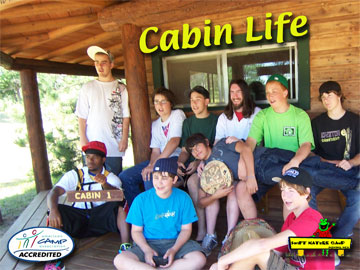Recently, I read the below article about keeping our children safe during a pandemic in the summer of 2021. I whole hardily agree in what was said and yet I found something missing. Last summer we ran summer camp without it. This year, science has brought testing, a game changer for overnight summer camps . Summer Camp will be more safe and manageable when overnight summer camps use preamp and during camp testing. Our “safe bubble” will more quickly be available getting us into the fun of Summer camp, COVID FREE. At SNC Policy will develop as the summer nears. But here is what we did in 2020, Camp COVID Policy

Summer Camps 2021: Health & Safety First
As school starts to wind down and vaccine rates increase, East End families are cautiously looking toward a summer of fun. Although we still don’t know what the summer will bring in terms of infection rates or public health policies, here are some tips to make your summer as safe as possible…
MASKS
As we’ve learned, COVID is a virus which attacks the respiratory tract and is spread by droplets (a small amount of liquid produced by exhaling). These tiny droplets can become aerosolized and fly through the air, where they can be inhaled by others. The best way to protect yourself and those around you is to be vigilant about wearing masks…even if someone has been vaccinated!
The best thing to do is to wear a cloth mask (either purchased or homemade, a good chance for some camp-inspired creativity) or a disposable mask (but save the N95 masks for your healthcare providers who have been properly fitted for them). Avoid masks with ventilation valves, as this can increase the spread of disease. The only way that a mask can protect anyone is to wear it correctly…this means masks should cover your mouth and nose at all times and fit snugly.
Try not to touch your mask while wearing it, and wash your hands if you do! When you remove your mask, remove it by the ear loops or tie—don’t touch the front of the mask (where the germs are) or your face. Wash or sanitize your hands after taking off your mask, and make sure to launder your mask regularly.
HAND WASHING—NOT GLOVES
The Centers for Disease Control (CDC) recommends that gloves only be used for those caring for or cleaning up after those who are sick. It is not necessary (and may be more dangerous) for your kids to use gloves during summer fun, especially during camp activities, including eating and drinking. If your child is wearing gloves and touches their face, it may make things worse.
Instead of gloves, remind them to wash or sanitize their hands frequently (with a product that is at least 60% alcohol). Make sure that their camp supplies include a liberal supply of hand sanitizer. You can make it fun by picking products of fun scents and colors. Washing your hands is one of the best ways to not only prevent COVID, but a whole host of other illnesses.
SOCIAL DISTANCING
This is still the most important way to keep yourself and your kids safe! Make sure that your kids’ camps are taking all reasonable precautions to limit large gatherings and plan more outdoor fun. When not at camp, continue to take precautions. When opting for outdoor dining venues, make sure the venue has spread-out tables and the staff are wearing masks. Be mindful of wearing masks in stores, following arrows in store aisles and not crowding cash registers. If you are venturing out to beaches or parks, choose times that are less busy and keep your distance from others.
Just because COVID is on everyone’s mind, there are also some non-COVID things to consider for the summer…
ALLERGIES
According to the CDC, food allergies are on the rise. About 6-8% of children have at least one food allergy and these can be serious. Symptoms of food allergies can include hives, itching, rashes, coughing, vomiting, lip swelling and difficulty breathing. In short, food allergies can be life threatening for some children.
If your child has a food allergy, make sure the camp staff understands exactly what triggers their symptoms, what their symptoms are and how to manage an emergency. Equip your camper with the medications recommended by your doctor, including an epi-pen (an injectable rescue medication for anaphylactic shock) if necessary. Remind your child to ask questions when offered new foods or treats, and be prepared to send special snacks for your day camper if the camp can’t accommodate special requests. If one of your child’s co-campers has an allergy, do your best to respect the rules and don’t send food that could be dangerous.
LYME DISEASE
Long Island (and Wisconsin) is notorious for deer ticks that carry Borrelia burgdorferi, the most common bacteria that cause Lyme disease, a tick-borne illness that can cause rash, joint pain, headaches, fever and swollen lymph nodes, among other symptoms. If untreated, Lyme disease can also cause neurologic symptoms and cardiac damage. It’s important to minimize your child’s risk for tick bites and to identify early signs of possible Lyme disease, which can be successfully treated with antibiotics.
Whenever possible make sure your child wears a hat, long sleeves and long pants in heavily wooded areas. Encourage them to tuck their pants into their socks to further minimize exposed skin. Make sure your child is using insect repellent, with 20% DEET concentration, but avoid their hands, mouth and eyes. When hiking through brush and woods, encourage your children to stay on well-marked trails, which tend to have fewer heavily wooded areas.
Once your child comes home after a long day, teach him or her to check themselves for ticks (or make sure their counselor at sleepaway camp encourages this). In general, the shorter the time a tick is on your body, the less likely it is to cause disease. A deer tick is as small as the period on the end of a sentence and may be hard to see, but make sure everyone is looking.
Finding a deer tick is not an automatic reason to visit the infirmary or your pediatrician, but it is important to stay vigilant. Symptoms of Lyme disease can appear up to a month after a tick bite. Remind your children to alert camp staff or you if they have fevers, feel achy or sick, have “swollen glands,” or a new rash. The classic rash associated with Lyme disease is a bullseye, also known as erythema migrans. Any of these findings should send your child to the camp infirmary or their home pediatrician.
SUNBLOCK
Camp is at its best and most fun when the sun is shining, but it’s crucial to protect your children from the risks it can pose. Remember, having five prior sunburns significantly increases your risk for melanoma (the deadliest form of skin cancer) later in life.
The sun is at its peak intensity from 10 a.m. to 4 p.m., which is usually prime time at camp. Encourage your children to wear wide-brimmed hats in the sun, as well as sunglasses with ultraviolet (UV) protection. It’s a chance for them to make a fashion statement, as well as a positive health choice!
Sunscreen only works when it’s being used in the right amounts and at the right times. Start with an SPF of at least 15 and cover all areas of the body that aren’t covered by clothing. It’s important to reapply sunscreen frequently—every two hours, especially if your child is swimming or sweating a lot in the heat. Even waterproof sunscreen must be reapplied. According to the American Academy of Pediatrics, a young adult needs about one ounce of sunscreen per application.
***
Although a few things are still unclear about this summer, by following these commonsense tips, we can make summer 2021 on the East End safe and fun for everyone!
Dr. Rina Meyer is a board-certified pediatric hematologist-oncologist in practice at Stony Brook Children’s. She is an assistant professor of clinical pediatrics at Renaissance School of Medicine at Stony Brook University. Her views are her own and do not necessarily represent the views of Stony Brook University or Stony Brook Children’s Hospital.










